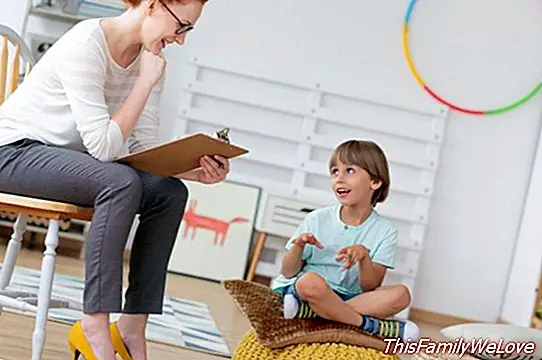How to react to children's learning difficulties

For many parents it is a hard blow to receive the news that your child has a learning disorder. The news that our little one has a attention deficit with hyperactivity, dyslexia, dyscalculia ... can immerse us in a sea of doubts. Becoming a therapist or teacher is not the solution, but there are a number of tips that will be of great help.
"When we learned that we were going to have a child, we imagined what his little face would look like, his voice, his character ... we dreamed of a perfect future for our little one, whom we wanted even before we met him. When he was born we counted his little fingers, sighing with relief to see they were all there. Years passed and it seemed that everything was developing perfectly. But one day at school they raised the alarm. They told us something was not right and recommended an evaluation to rule out problems. After several weeks of evaluation that seemed like years, it was time to receive the results. Learning Disorder All the plans we had made for our son seemed to collapse in front of us without we could do anything to remedy it".
This is a very common story among parents whose children have received a diagnosis such as dyslexia, hyperactivity ... words that until that moment had been heard. but they had not given importance.
What to do when we are diagnosed with a learning disorder?
Without a doubt, it is not easy to assimilate the blow of information like this. But what can we do from that moment? We must not forget that the child is still the same as the day before, when his diagnosis was not yet known. Their strengths and weaknesses remain the same, although now we can better understand what they owe and how to help them develop in the best possible way.
It is not a matter of presupposing that it has limitations, since it is not known how far it can go with the necessary help. What we can be sure of is that he will need the support and affection of his parents, his patience and his understanding.
And then, what should we do as parents with this information? The function is not different from the one they had before knowing the diagnosis. They will have to guide the child, from affection, on their journey towards maturity.
Guidelines for reacting to children's learning difficulties
It is not necessary for parents to become teachers or therapists. Neither that they acquire knowledge of medicine nor neuropsychology, but it can be positive to attend to the following guidelines:
1. Take the calm of the sea of doubts that arise at critical moments. Why does not my son want to do homework? Why are there days that do well and others do not? Will you be kidding me? ... Answering these questions correctly will help to raise the solution better.
2. Prioritize learning objectives. Addressing all contents at once will generate frustration in both the child and the family.
3. Establish a homework schedule. Duties can be made eternal when there are difficulties, so it will be convenient to talk with teachers to adapt the amount that is required.
4. Do not center the child's life on school work. It is convenient that they perform other activities, such as their hygiene habits, order and cleanliness and of course play and free time. He is capable of doing many things well, but if he only performs academic tasks we can not congratulate him for it.
5. Find the positive of each task you do. The difficulties are often accompanied by numerous errors in the tasks. If we highlight all these errors, you will be frustrated and try to avoid these situations. It is better to analyze what has improved with respect to previous days and rescue this information.
6. Go to a professional who works the affected areas so that it reaches the highest level of development possible.
Carolina Laguna. Neuropsychologist and Educational Psychologist. Associate professor in the Master in Neuropsychology and Education of UNIR. Director of the Department of Neuropsychology and teacher in Psychologists Pozuelo.




